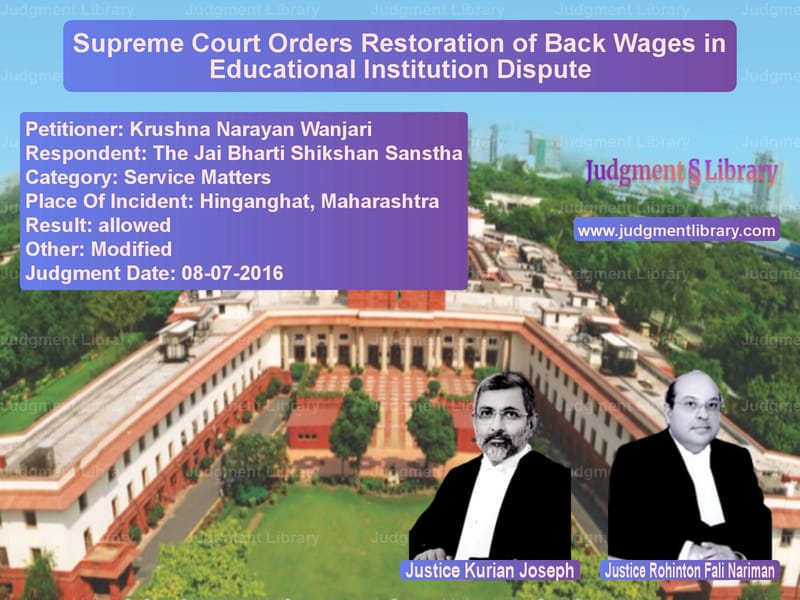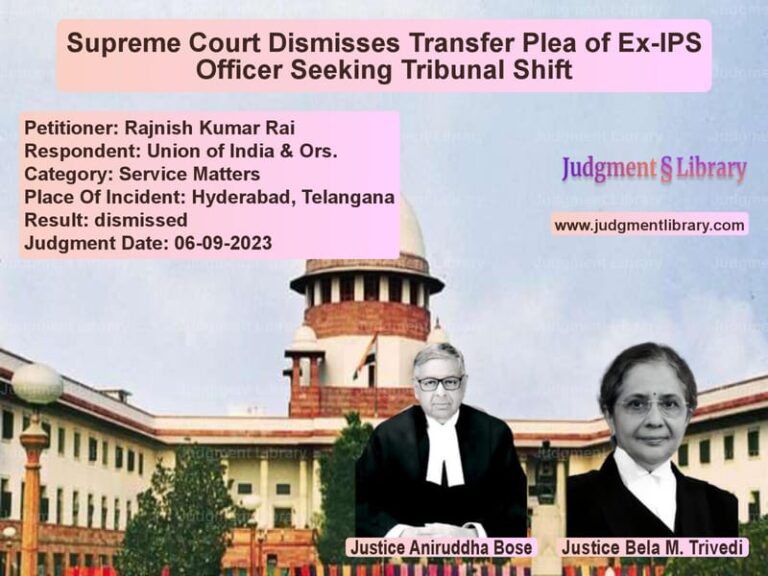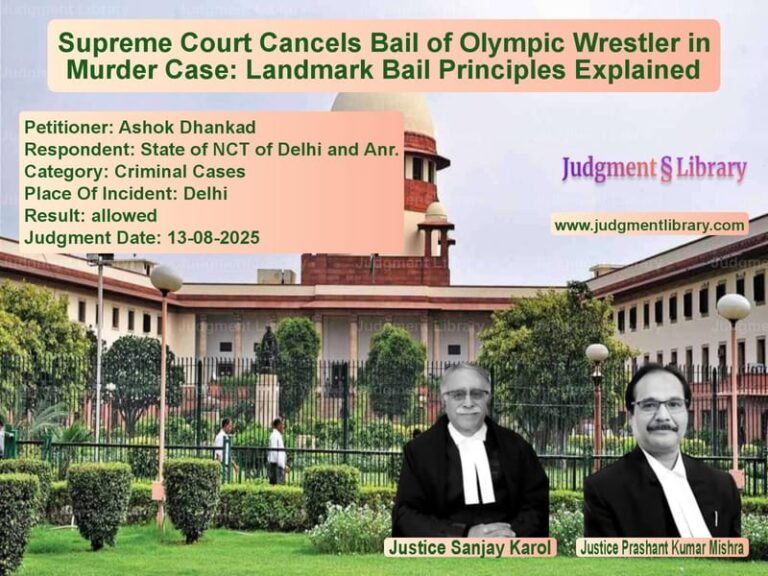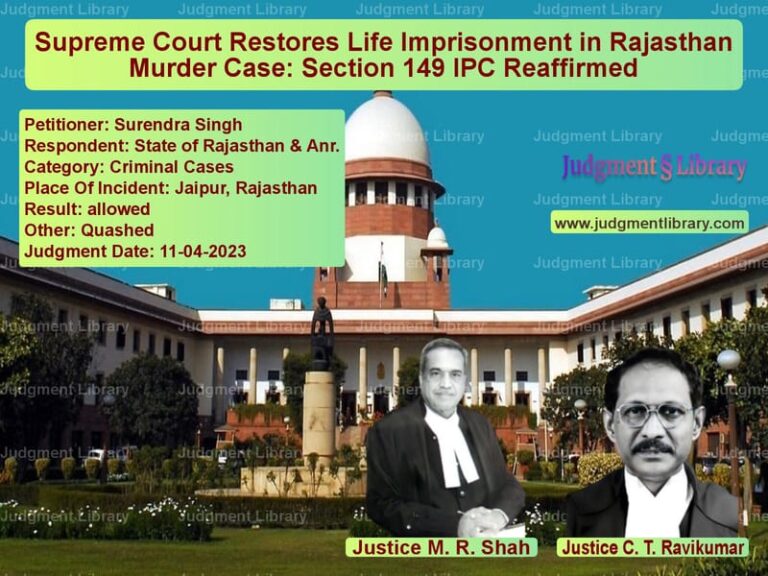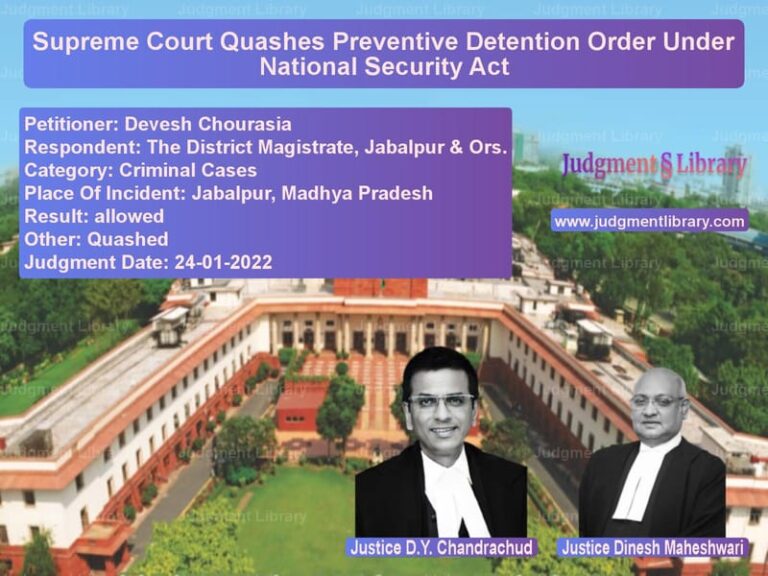Supreme Court Orders Restoration of Back Wages in Educational Institution Dispute
The Supreme Court in the case of Krushna Narayan Wanjari vs. The Jai Bharti Shikshan Sanstha, Hinganghat addressed the issue of back wages owed to a teacher employed in a government-aided educational institution. The case involved a dispute over salary payments for the period between 1996 and 2002, which were contested after the Industrial Tribunal’s decision in favor of the teacher was challenged by the respondent. The Court’s decision ultimately restored the ruling of the Industrial Tribunal, which had awarded the back wages and directed payment to the appellant.
Background of the Case
In this case, the petitioner, Krushna Narayan Wanjari, worked as a teacher at the Jai Bharti Shikshan Sanstha, an educational institution in Hinganghat. His employment was subject to various disputes, primarily regarding unpaid wages for the period from March 1996 to September 1997 and December 2001 to October 2002. Despite the Industrial Tribunal’s ruling in favor of the appellant and the issuance of an order for payment of the dues, the respondent institution failed to comply.
The dispute escalated when the respondent contended that the petitioner was not present for the work during the disputed periods, as the muster rolls did not indicate his attendance. Consequently, the High Court declined to entertain fresh evidence produced by the petitioner and sided with the institution, dismissing the claim for back wages.
Faced with the High Court’s refusal to review the evidence, the appellant approached the Supreme Court, arguing that the High Court had wrongly disregarded the Tribunal’s findings and the documents that substantiated the claim for back wages. The Supreme Court’s role was to address whether the High Court had correctly exercised its powers in rejecting the new evidence.
Key Legal Issues Considered
- Whether the High Court was justified in rejecting the evidence presented by the petitioner regarding his attendance.
- Whether the Industrial Tribunal’s order for back wages was valid and should be enforced.
- The legal implications of a 100% government-aided institution’s responsibility to pay salary arrears.
Arguments from Both Sides
Petitioner’s (Krushna Narayan Wanjari) Arguments
- “The documents and evidence produced clearly demonstrate that the appellant was employed during the disputed period.”
- “The High Court unjustifiably refused to consider the evidence, which was critical for ensuring justice.”
- “The Industrial Tribunal had considered all the evidence and had justifiably awarded the salary for the disputed period.”
Respondent’s (Jai Bharti Shikshan Sanstha) Arguments
- “The muster rolls do not indicate that the appellant was present for duty during the periods in question.”
- “The salary claims are not substantiated by sufficient evidence, and the High Court was right in dismissing them.”
- “As a 100% grant-in-aid institution, the State is responsible for the financial liabilities, including the payment of back wages.”
Supreme Court’s Judgment
The Supreme Court examined the arguments presented by both sides and emphasized the need for the High Court to have considered the fresh evidence produced by the petitioner. The Court noted that the Industrial Tribunal had evaluated the totality of the evidence, including attendance records and other documents, and had awarded the back wages appropriately. It also observed that the High Court had erred in not reviewing the new evidence submitted by the petitioner.
Key points from the Court’s judgment include:
- “The High Court erred in rejecting the new evidence presented by the petitioner.”
- “The Industrial Tribunal had thoroughly evaluated all the relevant materials before arriving at the decision, and there was no reason to overturn it.”
- “The amounts due under the Industrial Tribunal’s award should be paid within a three-month period from the date of production of the judgment copy.”
- “If the payment is not made within the stipulated time frame, 12% interest will accrue from the date of the Tribunal’s order.”
- “The officers concerned will be personally liable for the interest if the payment is delayed.”
Analysis of the Judgment
The Supreme Court’s ruling reaffirms the importance of judicial bodies, such as the Industrial Tribunal, in resolving disputes related to employment and wages. By restoring the Tribunal’s order and ordering the payment of back wages with interest, the Court reinforced the idea that fair compensation for work must be timely and complete, particularly when it is a matter of legal entitlement.
The Court also clarified the role of the State in cases involving 100% grant-in-aid institutions, emphasizing that the financial responsibility for compensating employees lies with the State, as it funds such institutions. The direction for personal liability of concerned officers underlines the importance of accountability in public institutions.
Key Directives Issued by the Supreme Court
- Restoration of the Industrial Tribunal’s Award: The Supreme Court restored the Tribunal’s order for payment of back wages for the period in dispute, affirming that the appellant’s claim was valid.
- Payment Deadlines: The respondent institution was directed to pay the salary within three months, with a provision for 12% interest if the payment was delayed.
- Accountability of State Authorities: The Court made it clear that the State was liable for paying the back wages as the institution was a 100% government-funded entity, and state authorities would be held accountable for any further delays.
Implications of the Judgment
This ruling has important implications for employment disputes in educational institutions and public sector organizations:
- Enforcement of Employment Rights: The judgment reinforces the importance of upholding employment rights, including fair compensation for work performed.
- State Responsibility in Educational Institutions: The decision clarifies the financial responsibility of the State in grant-in-aid educational institutions.
- Accountability in Public Sector Employment: The Court’s ruling highlights the need for transparency and accountability in public institutions, especially concerning the timely payment of wages.
Conclusion
The Supreme Court’s decision in Krushna Narayan Wanjari vs. The Jai Bharti Shikshan Sanstha highlights the importance of fair and timely compensation for workers, particularly in the context of public sector employment. By restoring the Industrial Tribunal’s order and directing the payment of back wages with interest, the Court ensured that justice was served. The judgment also clarified the responsibilities of the State in funding 100% government-aided institutions, reinforcing the principle of accountability in public sector employment.
Don’t miss out on the full details! Download the complete judgment in PDF format below and gain valuable insights instantly!
Download Judgment: Krushna Narayan Wanj vs The Jai Bharti Shiks Supreme Court of India Judgment Dated 08-07-2016-1741873294712.pdf
Direct Downlaod Judgment: Direct downlaod this Judgment
See all petitions in Employment Disputes
See all petitions in Termination Cases
See all petitions in Pension and Gratuity
See all petitions in Judgment by Kurian Joseph
See all petitions in Judgment by Rohinton Fali Nariman
See all petitions in allowed
See all petitions in Modified
See all petitions in supreme court of India judgments July 2016
See all petitions in 2016 judgments
See all posts in Service Matters Category
See all allowed petitions in Service Matters Category
See all Dismissed petitions in Service Matters Category
See all partially allowed petitions in Service Matters Category

